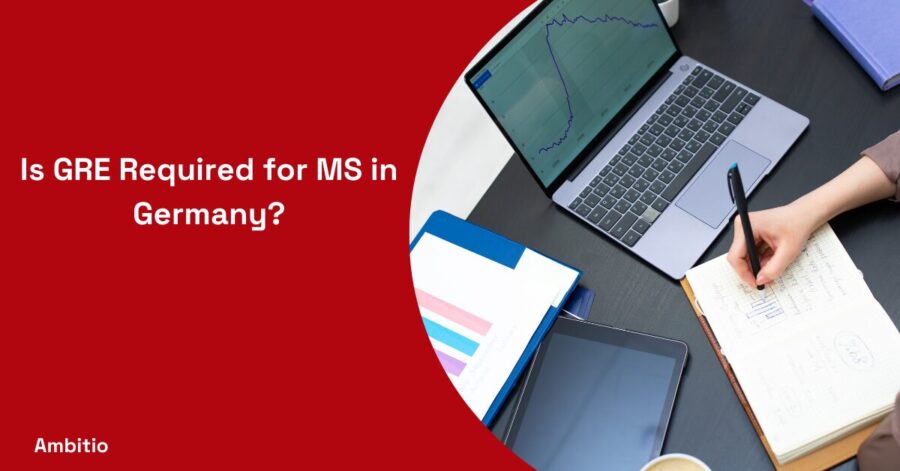9 April 2025
5 minutes read
Is GRE Required for MS in Germany?

Key Takeaways:
- Is GRE required for MS in Germany? Most German universities don’t require GRE scores, but certain programs like MBA or engineering may still ask for them.
- A strong GRE score can boost your application, especially for competitive programs and top universities.
- Always verify each program’s requirements, as alternatives like TOEFL/IELTS scores or professional experience may be accepted.
Did you know that over 80% of German universities do not require GRE scores for admission to MS programs? However, this doesn’t mean that all universities share the same policy. While many top German universities, such as RWTH Aachen and the Technical University of Munich, do not require GRE scores, some may still ask for it, particularly for certain fields like engineering, MBA, or other competitive programs.
The real challenge lies in navigating the complex admission process and understanding the eligibility criteria for each university. Deciding whether to take the GRE can be confusing, especially when you’re unsure if your university will accept GRE scores. Knowing where you stand with your GRE scores and whether they’re mandatory for MS in Germany can save you time and effort in the long run.
When Is GRE Recommended or Required for MS in Germany?
The decision to take the GRE for MS in Germany largely depends on the university and the program you are applying to. While many top German universities like RWTH Aachen and the Technical University of Munich do not require the GRE for admission to MS programs, some specialized fields, such as MBA in Germany or engineering, may still expect GRE scores. This is particularly true for private universities and competitive courses where a good GRE score can enhance your application.

If you’re aiming for top GRE accepting universities in Germany, it’s essential to check the specific requirements for each program. German universities accepting GRE scores often look for a strong verbal and quantitative score, especially for STEM fields. Applicants with a high CGPA and a good GRE score can strengthen their profile, increasing their chances of securing scholarships or financial aid. However, keep in mind that many public universities in Germany do not require the GRE, focusing more on your academic background, such as TOEFL or IELTS scores, to evaluate your eligibility.
What Is GRE Required for MS in Germany for International Students?
When considering whether the GRE is required for MS in Germany, international students need to understand the specific admission requirements for each program. The majority of German universities do not require GRE scores for MS courses, especially at public universities. However, some specialized programs, particularly in fields like MBA in Germany or competitive STEM programs, may ask for GRE scores as part of the application process.
For those planning to study in Germany, it’s important to check the list of German universities accepting GRE scores for their MS programs. While GRE is not mandatory for most universities, top universities accepting GRE scores may require a good GRE result to strengthen your application, especially for highly competitive programs. Understanding the GRE test structure, preparing for the GRE, and knowing which universities require GRE minimum scores will help you navigate the process of studying abroad. Additionally, understanding the cost of living, tuition fees, and scholarship opportunities is essential for international students looking to study in Germany.
10 Top Universities in Germany That Require GRE Scores
In the quest for higher education abroad, many Indian students are choosing to study MS in Germany, attracted by its top-ranked universities and competitive programs. While numerous universities in Germany do not require GRE scores, there are still several institutions that do, particularly for specialized courses like MBA or engineering.

A good GRE score can significantly strengthen your application, providing an edge in the competitive process of studying abroad. Here’s a list of Top 10 Universities in Germany that require GRE scores for MS programs:
| University Name | Average Tuition Fees (per year) | Average Salary (Post-Graduation) | QS Ranking |
|---|---|---|---|
| Technical University of Munich | €15,000 – €20,000 | €55,000 – €65,000 | 50 |
| RWTH Aachen University | €12,000 – €18,000 | €50,000 – €60,000 | 147 |
| University of Stuttgart | €10,000 – €15,000 | €45,000 – €55,000 | 223 |
| University of Heidelberg | €5,000 – €10,000 | €48,000 – €55,000 | 64 |
| Technical University of Berlin | €10,000 – €15,000 | €50,000 – €58,000 | 148 |
| University of Mannheim | €12,000 – €16,000 | €50,000 – €60,000 | 235 |
| Frankfurt School of Finance & Mgt | €20,000 – €30,000 | €70,000 – €80,000 | 402 |
| University of Freiburg | €5,000 – €10,000 | €45,000 – €55,000 | 170 |
| Leipzig Graduate School of Management | €15,000 – €25,000 | €60,000 – €70,000 | 457 |
| University of Munich (LMU Munich) | €10,000 – €15,000 | €55,000 – €65,000 | 64 |
These universities are known for offering high-quality programs in Germany that require GRE cut off for MS applications, especially in fields such as engineering, MBA, and technical sciences. When applying, ensure your GRE preparation is aligned with the specific score requirements of the universities you are applying to. Make sure you know about the GRE test, GRE scores for MBA programs, and the process of applying to these universities for an MS.
Alternatives to GRE for MS Admissions in Germany
While many universities in Germany accept GRE scores for MS admissions, not all require them. For international students looking to study abroad, particularly in Germany, there are several alternatives to the GRE for MS admissions.
Here are some options to consider:
- University-Specific Admission Tests: Some universities in Germany may have their own admission tests for MS programs, especially in specialized fields like arts and humanities or business.
- Strong Academic Background: Universities may prioritize your CGPA, academic performance, and research experience over standardized tests like the GRE, particularly for MS programs in Germany that focus on technical or scientific fields.
- TOEFL/IELTS Scores: For MS programs in Germany, proficiency in the German language or English (for English-taught programs) is often required. Strong TOEFL or IELTS scores can sometimes be used as an alternative to GRE scores, particularly in non-STEM fields.
- Professional Experience: Many universities, especially for MBA in Germany, might waive GRE requirements if you have substantial work experience or have contributed to research projects relevant to the program you’re applying for.
- Letter of Recommendation (LOR): Some universities might weigh your Letter of Recommendation (LORs) more heavily in the absence of GRE scores, particularly for applicants with relevant work experience or strong academic credentials.
- Portfolio Submission: In creative fields like arts, design, or architecture, universities may request a portfolio of your work as an alternative to GRE scores.
- Scholarship Programs: Some scholarships for international students opportunities, especially for international students, may not require GRE scores and instead focus on your academic potential, research interests, and other achievements.
If you’re wondering whether GRE is required for MS in Germany, it’s essential to check the specific requirements of each program. Many universities do not require GRE scores but may have their own set of criteria for evaluating applicants. Make sure you know more about the GRE and other requirements to build your profile accordingly.
Conclusion
Whether GRE is required for MS in Germany depends on the university and program you choose. While many top universities in Germany do not require GRE scores, certain specialized programs like MBA or engineering might. For students interested in masters in Germany, it’s essential to thoroughly research the admission requirements of each university. A good GRE score can significantly strengthen your profile, especially for competitive programs.
If you’re unsure whether to appear for the GRE, it’s crucial to understand the process of studying in Germany, including the score requirements for your desired program. Some universities may focus on your CGPA, research experience, or TOEFL/IELTS scores instead of the GRE.
To help you navigate the Germany admission counseling process and tailor your application, Ambitio can provide personalized guidance. Want to study MS in Germany? Let Ambitio Pro help you build your profile and prepare for your journey. Apply for an MS in Germany with confidence!
FAQs
Is GRE mandatory for all MS programs in Germany?
No, many universities have moved away from mandatory GRE requirements, emphasizing a holistic evaluation.
Which universities in Germany accept GRE scores?
Universities like RWTH Aachen, Technical University of Munich, and others may consider GRE scores, but the significance varies.
Can a good GRE score enhance my application?
While a good GRE score can add value, universities now focus on overall profiles, encompassing academic history and other accomplishments.
How important are GRE scores in the admission process?
The importance of GRE scores varies among universities. While some may consider them, many now prioritize your overall profile, including academic history, experience, and passion for your chosen field.
Can I still submit GRE scores even if they’re not required?
Yes, you can choose to submit GRE scores if you believe they enhance your application. However, it’s crucial to weigh the potential impact of your scores against other aspects of your profile.
What factors besides GRE influence admission?
Academic performance, work experience, SOP, LORs, and CV are also crucial factors.
Should I take the GRE if I aim for ambitious universities?
Yes, taking the GRE can strengthen your application for top universities.

You can study at top universities worldwide!
Get expert tips and tricks to get into top universities with a free expert session.
Book Your Free 30-Minute Session Now! Book a call now




























